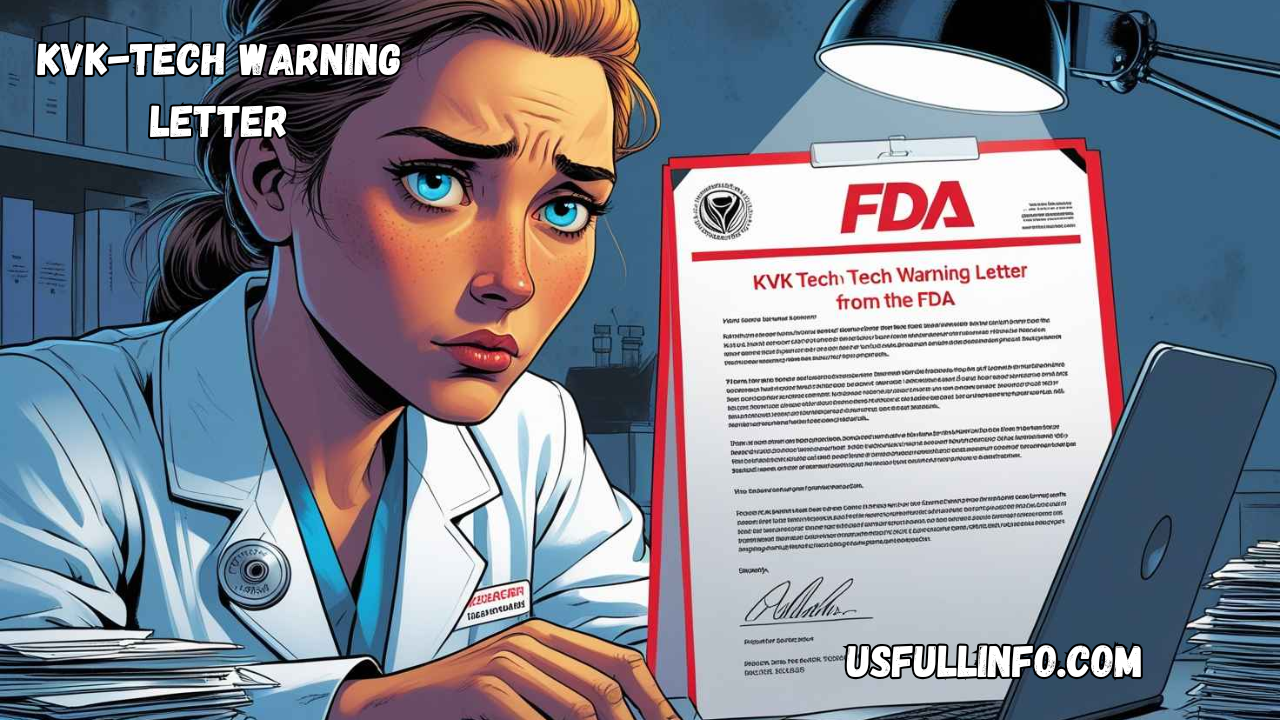KVK-Tech, a pharmaceutical company specializing in the development and manufacturing of generic medications, has faced significant regulatory scrutiny from the U.S. Food and Drug Administration (FDA). The issuance of an FDA warning letter to KVK-Tech raises serious concerns about compliance with Good Manufacturing Practices (GMP), product quality, and patient safety. In this article, we will explore the details of the warning letter, the specific violations cited by the FDA, the potential consequences for KVK-Tech, and the broader implications for the pharmaceutical industry.
Background on FDA Warning Letters:
An FDA warning letter is an official notification issued by the agency to companies that are found to violate regulatory requirements. These letters serve as a formal warning and demand corrective action. Failure to address the issues outlined in a warning letter can lead to severe consequences, including product recalls, import bans, injunctions, and even criminal prosecution.
For pharmaceutical companies, receiving a warning letter is a serious matter that can affect their reputation, regulatory status, and financial standing. Companies must take swift and effective action to resolve the cited violations to avoid further regulatory enforcement actions.
Key Issues in the KVK-Tech Warning Letter:
The FDA’s warning letter to KVK-Tech highlighted multiple violations, primarily related to manufacturing processes, quality control, and data integrity. Below are some of the critical areas of concern outlined by the agency:
Deficiencies in Good Manufacturing Practices (GMP)
The FDA found that KVK-Tech failed to comply with GMP regulations, which are designed to ensure the quality, safety, and efficacy of pharmaceutical products. Specific issues included:
Inadequate written procedures for manufacturing processes
Failure to properly validate and maintain equipment
Poor documentation practices
Inadequate training of personnel
These deficiencies pose a risk to product quality and patient safety, as non-compliance with GMP regulations can lead to contamination, incorrect dosages, and ineffective medications.
Data Integrity Concerns:
Data integrity is a crucial aspect of pharmaceutical manufacturing and regulatory compliance. The FDA cited KVK-Tech for serious data integrity issues, including:
Incomplete or missing batch records
Failure to maintain accurate test results
Deletion or alteration of quality control data
Lack of oversight and review of manufacturing records
Data integrity violations undermine confidence in the company’s ability to produce safe and effective medications, leading to potential regulatory sanctions and loss of consumer trust.
Quality Control and Testing Failures:
The warning letter also detailed significant deficiencies in KVK-Tech’s quality control systems. Specific violations included:
Failure to conduct adequate testing of raw materials and finished products
Inadequate investigation of out-of-specification (OOS) test results
Poor handling of consumer complaints and adverse event reports
These failures suggest that KVK-Tech did not take the necessary steps to ensure the consistency and reliability of its pharmaceutical products, putting patients at risk.
Consequences of the Warning Letter
Receiving a warning letter from the FDA can have several immediate and long-term consequences for KVK-Tech:
Regulatory and Legal Repercussions:
The company must submit a detailed response to the FDA outlining corrective actions within a specified timeframe.
The FDA may conduct follow-up inspections to verify compliance.
Continued non-compliance could lead to severe penalties, including product seizures, injunctions, or facility shutdowns.
Financial and Business Impact:
Warning letters can lead to a loss of contracts and partnerships.
The company may experience revenue declines due to product recalls or market restrictions.
Investors may lose confidence, leading to a drop in stock value and market reputation.
Reputational Damage
Customers, healthcare professionals, and regulatory bodies may view the company as unreliable.
Competitors may use the warning letter to their advantage, capturing market share.
Rebuilding trust in the industry and among consumers can take years.
Steps to Address Compliance Issues:
To recover from an FDA warning letter, KVK-Tech must take comprehensive corrective actions, including:
Implementing Robust Corrective and Preventive Actions (CAPA)
Conduct a thorough investigation to identify the root causes of the violations.
Develop a plan to address each issue in a systematic and verifiable manner.
Enhance internal monitoring and auditing mechanisms.
Strengthening Quality Control Measures:
Upgrade laboratory testing procedures and quality assurance protocols.
Improve training programs for employees to ensure adherence to GMP standards.
Implement stricter oversight of data recording
Engaging Regulatory Consultants and Experts
Seeking assistance from regulatory compliance experts can expedite the resolution process.
External audits can help identify gaps in compliance before FDA reinspection.
Lessons for the Pharmaceutical Industry
The warning letter issued to KVK-Tech serves as a critical reminder for other pharmaceutical companies about the importance of maintaining rigorous compliance with FDA regulations. Key takeaways include:
Commitment to Quality: Companies must prioritize quality at every stage of production.
Transparency and Accountability: Ensuring data integrity is essential for regulatory approval and consumer trust.
Proactive Compliance: Regular self-audits and compliance training can prevent regulatory actions.
Conclusion:
The FDA warning letter to KVK-Tech underscores the serious consequences of failing to adhere to regulatory standards. While the company has an opportunity to address the issues and regain compliance, the situation highlights the importance of strict adherence to Good Manufacturing Practices and quality control. By taking corrective actions and fostering a culture of compliance, KVK-Tech can rebuild its reputation and ensure the continued safety and efficacy of its products. The case also serves as a valuable lesson for the broader pharmaceutical industry, emphasizing the need for continuous vigilance in regulatory compliance and quality assurance.





